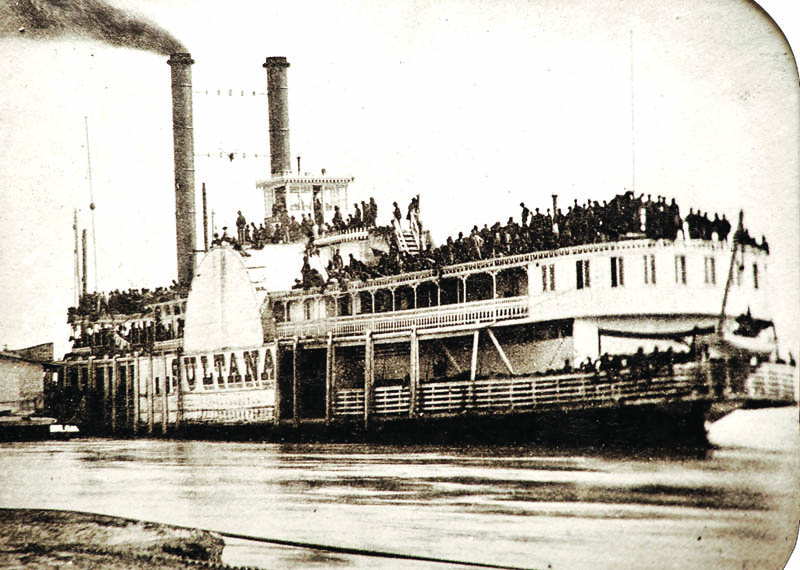Tennessee history for kids
Sultana disaster killed 1,167 people near Memphis

It was carrying an estimated 2,100 people, most of them Union prisoners on their way home from Confederate prisoner-of-war camps.
At about 2 a.m., the boat exploded. Nearly 1,200 people were burned to death, drowned or died of hypothermia.
The reason the Sultana is unknown to many people today is that the tragedy occurred in the busiest “news month” in American history.
After Robert E. Lee surrendered to Ulysses S. Grant on April 9, 1865, the Civil War quickly drew to a close.
Under the terms of the surrender agreement, prisoners of war on both sides were to be freed and sent home as soon as possible.
In the South, an estimated 5,500 prisoners at the Cahaba POW camp in Alabama and at the Andersonville POW camp in Georgia were sent to Vicksburg, Miss.
There they waited a few days to be loaded onto boats heading north.
The Union Army commanders ordered these prisoners of war onto boats that happened to be heading up the Mississippi River at the time.
The government offered to pay steamboat owners $5 per enlisted man and $10 per officer transported.
The first boat that transported freed prisoners north from Vicksburg took about 1,300 men.
Then another boat headed north with 700 freed prisoners.
What happened next makes little sense. The Sultana pulled into Vicksburg at about the same time as two other steamboats.
After a couple of days, the Sultana left with about 2,000 prisoners of war (plus an additional number of crew and passengers and a shipment of sugar bound for Memphis).
The other two boats left Vicksburg with no freed prisoners on board, but plenty of room for them.
At the time, many people noticed how overcrowded the Sultana was, and wondered why the other two boats were not given any former prisoners to transport.
A former prisoner named James Brady, who was on the Sultana, said he and his fellow troops has been “packed in more like hogs than men.”
The Sultana had an official capacity of 376 people, about one-sixth the number of people on board.
To make matters worse, the Sultana had a mechanical problem.
One of the boilers that converted water to steam to drive its wheel had developed a leak.
A mechanic brought on board in Vicksburg had patched the leak, but he warned the ship’s captain (and part owner) J. Cass Mason that it might not hold.
Mason ignored the warning.
The Sultana pulled out of Vicksburg on April 24, heading north, fighting the swollen current of the Mississippi River.
The boat made stops in Helena, Arkansas, and in Memphis, before pulling out late on the evening of April 26.
At 2 a.m. on the 27th, the Sultana’s boilers exploded.
The explosion threw many passengers and crew into the water, destroyed a large part of the boat, and started a fire that quickly destroyed the rest of the boat.
You can read the accounts of some of the survivors in books about the disaster. Some people burned to death; many drowned; and many froze to death from exposure after jumping into the Mississippi River.
Most of the people who survived did so because they were able to hold onto parts of the floating wreckage until they reached shore.
Gene Salecker’s 2022 book “Destruction of the Steamboat Sultana” puts the number on board at about 2,100 and estimates that 1,167 people were killed.
After the disaster, a military inquiry tried to determine the cause of and blame for the Sultana explosion.
In the last 158 years, historians have asked the same questions.
Many of them have concluded that Captain Mason bribed Union army officers into letting him transport as many freed prisoners as possible.
“The disaster was caused by greed, corruption, gross stupidity and military officers who just didn’t care,” says Jerry Potter, author of “The Sultana Tragedy: America’s Greatest Military Disaster.”
Mason was killed in the accident. Capt. Frederick Speed of the U.S. Army was found guilty of grossly overcrowding the Sultana, but his verdict was overturned by the army.
So in the end, the U.S. Army never punished anyone for the disaster.
Most of the Union soldiers killed in the Sultana disaster were from Ohio, Indiana, Michigan and East Tennessee.
Because of this, there are monuments devoted to the Sultana disaster in places as far apart as Mansfield, Ohio; Hillsdale, Michigan; and Knoxville.
The saddest memorials can be found in Memphis.
In the chaotic days and weeks in which bodies were found in the Mississippi River, there was no way to identify most of the dead.
Therefore, when the Sultana victims were buried in the Memphis National Cemetery, they were buried as unknown soldiers.
• Next: How a group of history buffs brought the Sultana story into our collective memory
Bill Carey is the founder of Tennessee History for Kids, a nonprofit organization that helps teachers cover social studies.


